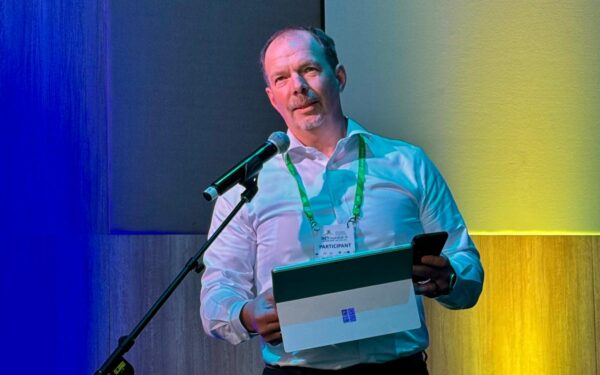CIRA CEO concerned about lack of outrage among Canadians on NSA surveillance of Internet users around the globe.
As someone who works at the very heart of the Internet, I am concerned by the lack of outrage among Canadians about the National Security Agency’s (NSA) PRISM program which is monitoring the activities of Internet users around the globe and in our own backyard. I made my feelings about it clear in this opinion piece I wrote for the National Post, but even more information has been revealed about what information is collected since it was published last week.
On Wednesday, the Guardian reported that the surveillance activities of the NSA in the U.S. and the Government Communications Headquarters in the United Kingdom go far beyond what we previously thought. Both agencies are apparently able to crack into encrypted communications. This means that online encryption – something most of us rely on to keep our personal information like banking records such as HTTPS and Secure Sockets Layer (SSL) – is not private. What I find most disturbing in the Guardian’s report is that the NSA has been working with technology companies and Internet service providers to insert “secret vulnerabilities – known as backdoors or trapdoors – into commercial encryption software.” It appears nothing online is safe from prying eyes, even encrypted information. And with these revelations that the NSA has been inserting weaknesses into internet security standards, any trust end users had in Internet transactions is certainly eroding.
National security is important – protecting its citizens is both a government’s right and responsibility, and surveillance is a necessary tool in that regard. But, as I discussed in my last post, we’re talking about a government monitoring its citizens without judicial oversight. This isn’t surveillance like we’ve had in the past with phone taps and opening mail (both requiring a warrant). This is surveillance and storage of emails and Internet histories without a warrant – the government does not need to show any cause to monitor any citizen online. Most of us in the western world have a long history of rejecting that level of state control over an individual’s freedom.
As I stated in my last post, in Canada we only have to look at the Royal Commission into Certain Activities of the Royal Canadian Mounted Police (the MacDonald Commission), or to the Cold War for examples. The truth is Canadians are concerned about privacy. A recent study by the Office of the Privacy Commissioner of Canada (OPC) found that two thirds of Canadians are concerned with protecting their privacy (PDF). So then why do Canadians seem apathetic about their online privacy? What is it about the Internet that changes our perceptions and values concerning this important right?
We worked with Ipsos Reid, the international opinion research company, to understand what Canadians think about online surveillance. On our behalf, Ipsos Reid conducted a survey of Canadians between July 24 and 28, 2013. Let’s be clear about one thing upfront – while Canada does have an online surveillance program, we do not have a program with the depth and breadth of activity like PRISM. What we do have, however, is an opportunity to have the important discussion about what is and isn’t acceptable in terms of surveillance in the digital age before it has a chance to become what was revealed south of the border. I was surprised to find out that half of Canadians (49 per cent) believe it is acceptable for the government to monitor email and other online activities of Canadians in some circumstances. When those circumstances include preventing “future terrorist attacks,” that number rises to 77 per cent. That means that more than three quarters of Canadians are fine with the government monitoring our online activity, as long as it is in the interest of national security. Why? Our apathy may be in part due to the fact that only 18 per cent of us believe our Internet activity is confidential. In fact, our research shows that four in 10 of us believe the federal (Canadian) government is tracking their Internet activity. Sixty-three per cent believe that the government is monitoring who visit certain websites.
If most of us aren’t expecting privacy on the Internet, it would follow that we would be ambivalent about government’s watching us there. And, nearly 60 per cent of Canadians agree that they would be willing to give up their privacy on the Internet if it ‘would help the government foil terrorist plots’ – when it comes to national security, we’re much more forgiving. Again, yes, I believe surveillance is a necessary tool for a government to use in the protection of its citizens. However, it must have appropriate and transparent judicial oversight. And if you were going to use the ‘I have nothing to hide argument’, I encourage you to read this. The author points out that with the absurd number of laws there are (in the U.S., for example, there are 27,000 pages of federal statutes); the likelihood that you’ve violated at least one and don’t even know it is highly likely. Besides, even if you have nothing to hide, I bet you still close your curtains at night. We all need parts of our lives to be kept private. He also makes a strong argument that we should have something to hide. The fact is social progress is often preceded by illegal activity.
Last week we celebrated the 50th anniversary of Martin Luther King’s “I have a dream” speech. We now know that the FBI was spying on King and his counterparts in an effort to discredit him and the movement as a whole. It makes me wonder how far the civil rights movement would have come if the FBI had the technology to monitor communications that we have now. If that doesn’t convince you, then I’d point out that for decades we in the west have vilified authoritarian regimes that would use these tactics, like the Stasi in East Germany, the KGB in the USSR or the Communist Party of China. The fact is that less than a generation ago we were willing to go to war – at least in part – over the degree of control a state should have over its citizens. Has our moral compass shifted that much in the years since the Berlin Wall fell? I’m not a lawyer, but am I wrong in thinking that in Canada NSA-like surveillance would be a violation of our Charter rights? After all, under the Charter of Rights and Freedoms, Canadians have the right to be free from unreasonable searches and seizures of their property and their personal information. The determination of what is reasonable is up to a judge to make – it is not something to be carried out with a lack of judicial oversight.
Two quick side notes. Interestingly, Canadians are a lot less forgiving when it comes to the private sector tracking us online. Only 20 per cent of Canadians are willing to give up their Internet privacy if it would help business they deal with provide them with information about new products or sales they might be interested in. When it comes to online surveillance, we’re not that different from our neighbours to the south. A similar survey conducted in the United States found that 45 per cent of Americans think it’s acceptable for their government to monitor emails to prevent terrorist attacks. To read the entire results of the survey and the survey methodology, visit our website (PDF). I believe we need a national dialogue about online surveillance in Canada. While I believe offline surveillance – like wiretaps – provide a precedent for online surveillance, the sheer size and ubiquity of Internet communications is a bit of a game changer, so to speak. Never before has the government had the ability to monitor so much activity of so many people. Technology may have given governments the means to monitor us online, but that doesn’t mean we have given governments the right to do so. I’m repeating the questions I asked in my last post: Is it that we don’t care, or that we don’t understand, or has our moral compass shifted enough in the past two decades that we’re now okay with governments tracking our every move? I’d like to hear your thoughts – why do Canadians seem so complacent with government surveillance?
Byron Holland (MBA, ICD.D) est président et chef de la direction de CIRA, l’organisme national à but non lucratif mieux connu pour sa gestion du domaine .CA et pour l’élaboration de nouveaux services de cybersécurité, de registre et de DNS.
Byron est un expert de la gouvernance de l’Internet et un entrepreneur aguerri. Sous l’égide de Byron, CIRA est devenue un des principaux ccTLD au monde en gérant plus de 3 millions de domaines. Au cours de la dernière décennie, il a représenté CIRA à l’échelle internationale et occupé de nombreux postes de dirigeant au sein de l’ICANN. Il siège présentement sur le conseil d’administration de TORIX en plus d’être membre du comité des mises en candidature de l’ARIN. Il habite à Ottawa en compagnie de son épouse, de leurs deux fils et de Marley, leur berger australien.
Les opinions partagées sur ce blogue sont celles de Byron sur des enjeux qui touchent l’Internet et ne représentent pas nécessairement celles de l’entreprise.





